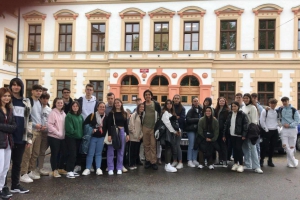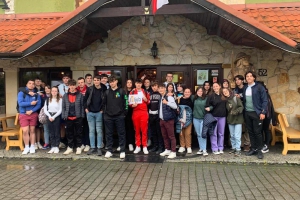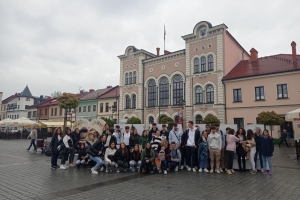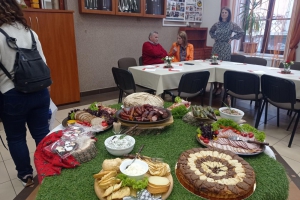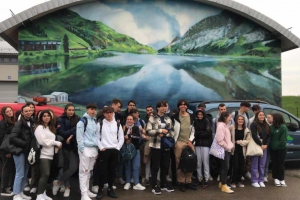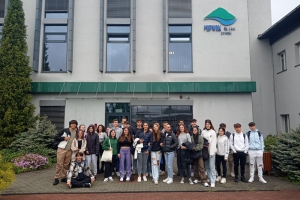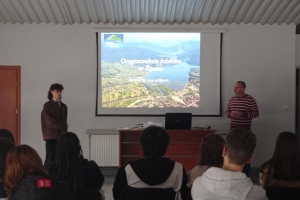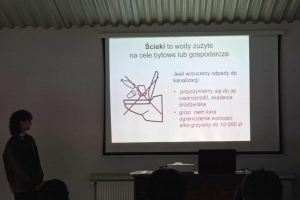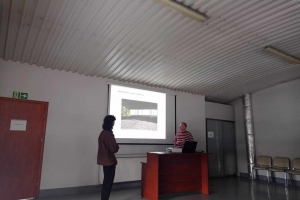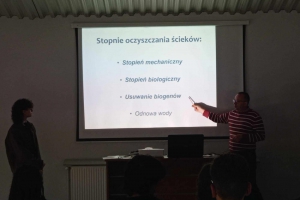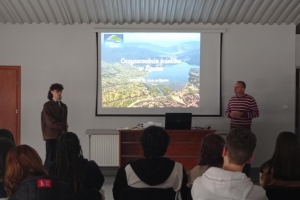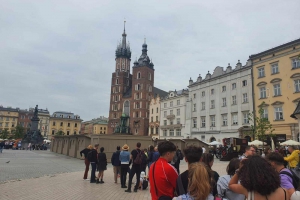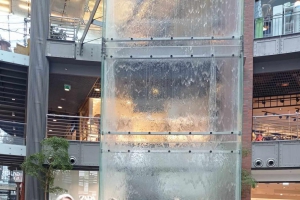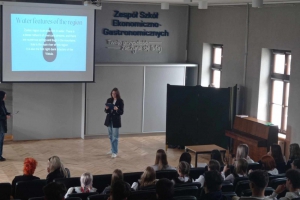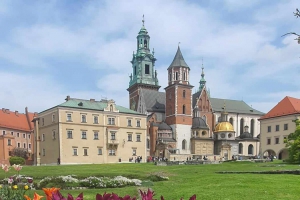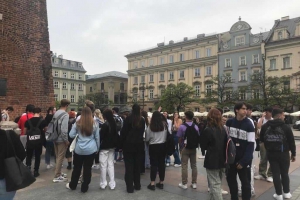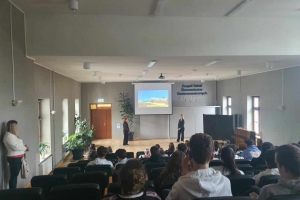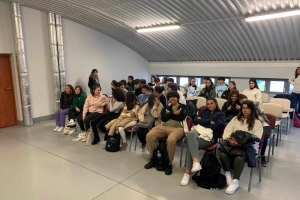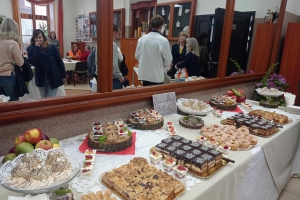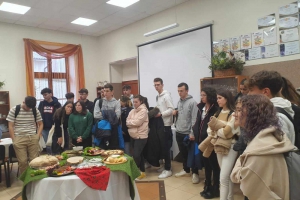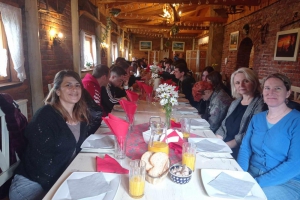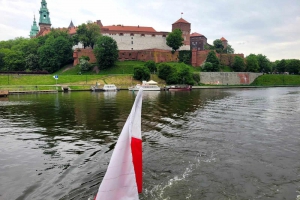The group of students from schools in Santa Pola, Spain and Ruffec, France performed the mobility to Spain, where the hosts were the teachers and students from Zespol Szkol Ekonomiczno-Gastronomicznych (ZSEG) in the town of Żywiec, Poland. There were groups of 16 students from France, Poland and Spain which sums up to 48 students participating in the project during the mobility in Spain. The students were accompanied by assigned teachers – Maria Garcia Martinez and Marta ___ from Spain; Murielle Mazeau and Maryline Andre from France. The coordinator teacher in Poland was Halina Rus-Szymanska with different teachers assigned to each performed task. The arriving students and teachers were accommodated in the Hostel Zajazd Beskidy in Żywiec.
The mobility lasted from 14th May to 18th May 2023.
During the mobility time students performed the activities which were discussed and set earlier – during the short-term joint staff exchange in France which took place in March 2022 and later on during the online meetings and e-mail exchange among the teachers and students from the schools.
The activities performed were all linked to the main idea of the project, which is „Water – a task for environmental responsibility”.
The mobility in Spain lasted five days and during each days different tasks were performed.
Day one – Sunday, 14th May 2023
The groups of students and teachers from Spain and France arrived and were accommodated in Zajazd Beskidy Hostel. The groups were welcomed by studenst and teachers from Polish school.
In the afternoon the students were given a sightseeing tour around the center of Żywiec during which the city game prepared by Polish students. This assignement let the students learn about the town of Żywiec, its main attractions, history and culture. It also included questions about water in the Żywiec area.
After playing the city game and intergrating in international groups, the students visited the Habsurg Castle which is transformed into the museum nowadyas. There was a tour given by a museum guide who explained to the students the history of Żywiec, its connection with the Habsburg family in Europe and the connection between the Habsburg family in Żywiec and the Royal family in Spain. It also let the students to get accustomed with the Zywiec area traditions, habits and history.
The day finished with the walk the students took to the joint of the two main rivers in Żywiec – Soła and Koszarawa. The students walked along the banks of the rivers and observed the plant and bird species characteristic for this site.
Day two – Monday, 15th May 2023
All the participating groups from Poland, France and Spain visited the Sewage Treatment and Purification Plant in Żywiec. They learnt about the sewage system in the town, they learnt about the methods of water purification and its importance for the citizens. They discovered that this plant is one of the mostly sophisticated ones in Poland. Because of its action it is possible to keep the waters of the big Żywiec Lake, which is an artificial water reservoir, clean. They watched a PP presentation, listened to a lecture and took part in workshops there.
Afterward they took a boat cruise on the waters of the Żywiec Lake. They learnt how this reservoir was created – it used to be a part of the city before, but due to this part being often flooded, the decision was made to overflood it. Now this lake adds to the beauty of the region since it is surrounded by the mountains, is used as a recreational area and is home to many different species of plants, fish, birds, amphibians, mammals and invertebrates. It plays a crucial role in protecting the town from being flooded and serves as a supply of water during the time of drought.
After lunch the students and teachers visited the ZSEG school in Żywiec. They were welcomed by the school authorities and given a tour around the school. The students from Spain and France learnt about different professions that are taught in the school and tasted delicious dishes prepared and served by the gastronomy and catering section. The Polish students prepared and presented videos and presentation about Poland, its rivers and lakes, about the places of interest the groups were to visit in the following days and the Żywiec area.
On their way back, they visited the memorial place and museum of Auschwitz-Birkenau.
Day three – Tuesday, 16th May 2023
The students and teachers took a sightseeing tour around the city of Krakow, which used to be the capitol of Poland in the past. They visited all the important historical monuments and places connected with water and its importance for the citizens of Krakow. They learnt about the water supply system in Krakow which comes from three rivers (Słanka, Dubnia, Rudawa) and Dobczycki Lake and how the water is made drinkable for the citizens
In the afternoon the students took a boat cruise on the River Vistula which is the longest and biggest river in Poland. They learnt about its importance to the people of Poland. They discovered different species of fauna and flora in the Vistula River. They learnt about its sources and its estuary to the Baltic Sea. They completed the quiz about the river.
Day four – Wednesday, 17th May 2023
This was an entertainment day for the students and teachers from our project – a visit to an amusement park Energylandia which included the water park attractions.
In the afternoon, the students worked in international groups and brainstormed about the things they learnt about the water importance for the whole world population, which they learnt during their mobilities in France, Spain and Poland. They discussed the similarities and differences concerning water, such as water supply and demand, water sources, water scarceness, rainfalls, access to drinkable water among the three countries – Poland, France and Spain. They also discussed and compared the courses of rivers prepared during the project.
Day five – Thursday, 18th May 2023
For today a trip to Park Grodek, which is known as “Polish Maldives” was planned but it had to be cancelled due to heavy rainfalls. This place has a lake and many strolls in the area are possible. Different lectures and workshops concerning water were planned for this day.
An alternative plan for the day was created and the groups visited the city of Bielsko-Biała and the Żywiec Brewery Museum. Bielsko-Biała is a city 20 km away of Żywiec and it is actually created by two towns situated on two banks of the river Biała. The students learnt how important the river is to its citizens – economically and historically. In the past it used to be a border between the states of Bohemia and Poland.
The Museum of Brewery in Żywiec was an important site to see for students as well since they could learn about the history of the brewery tradition in Żywiec area and how the water is used for this process. The Żywiec beer is an important trademark for Poland and is known worldwide.
In the afternoon students from all the participating countries took part in evaluation activities. They completed the survey about Poland and Polish water supplies, they brainstormed about things they learnt during the mobilities, they edited pictures and videos they made.
In the evening the all involved students and teachers took part in the farewell dinner.
How did the participation in this activity benefit the involved participants?
The participation in this activity benefit the involved participants in the following ways:
- The participants learnt about the main river in Poland, the Vistula River – its sources, its flow, its importance for the people in Poland.
- The participants learnt about the Soła and the Koszarawa rivers which are two rivers flowing through Żywiec – their sources and importance for the town of Żywiec and the whole region.
- The participants saw the Sewage Treatment and Purification Plant in Żywiec, learnt how it works and what significance it has for both the citizens of Żywiec and the life biodiversity in the Żywiec Lake.
- The participants learnt about the Żywiec Lake – the history of the lake, the importance in flood preventing and being the main water supply reservoir for the area, the ecology of the lake
- The participants learnt about water connected issues in Poland – what are the main rivers and lakes, what is the annual rainfall, how water is used for both domestic and industrial purposes, what are the main sources of drinkable water, what are the main water species. They could also compared these issues with similar ones concerning France and Spain.
- The participants learnt about the upper course of the rivers using the example of the River Vistula and its sources on Barania Góra (the mountain in the Żywiec area from where the river flows). They could compare with the middle course which was discussed during the mobility in France and the lower course which was discussed during the mobility in Spain.
- The participants learnt about Polish customs, history, culture, traditions and cuisine, especially the ones in the Żywiec region.
- The participants had a chance to discuss all the issues concerning waters which were discussed during the project in international groups.
- The participants had an opportunity to speak and practice the English language.
- The participants had an opportunity to meet and talk to Polish people – students and teachers from the ZSEG school, the local people, the lecturers in the places of visit.
- The participants had an opportunity to try local cuisine (typical for Poland and specifically for the Żywiec region)
- The participants had an opportunities to participate in different types of cultural events, sightsee places in Poland, perform useful tasks and solve problems.
The participants evaluated all the activities that were done during the mobilities

